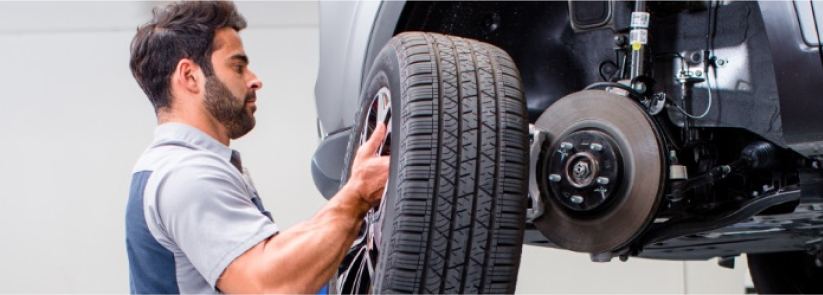Morris Tire: Exceptional Tire Solutions for All Vehicles
Morris Tire: Exceptional Tire Solutions for All Vehicles
Blog Article
The Web Link In Between Tire Solution and Fuel Efficiency
Among the numerous elements that affect fuel performance, tire service stands out as a crucial component that frequently goes forgotten. The elaborate connection in between tire upkeep and gas economic climate is a testament to the complex functions of an automobile.
Importance of Correct Tire Rising Cost Of Living
Appropriate tire inflation is a critical variable in making the most of gas efficiency and making sure ideal vehicle performance. When tires are underinflated, it produces a lot more moving resistance, triggering the engine to work more challenging and melt more gas to preserve the same rate. On the various other hand, overinflated tires can cause a harsher adventure, unequal tire wear, and decreased grip. To find the advised tire pressure for your vehicle, refer to the owner's guidebook or the sticker situated on the vehicle driver's side door jamb.
Keeping the correct tire pressure not just enhances fuel efficiency yet additionally improves driving safety. Frequently inspecting and readjusting tire pressure, especially before long trips, is a straightforward yet reliable means to maximize your automobile's fuel economic climate and make sure a smooth driving experience.
Effect of Tire Footstep Depth
Maintaining the recommended tire stress is vital for ideal lorry performance and fuel efficiency; in a similar way, the walk deepness of your tires plays a critical role in making sure security and traction when driving. Tire step depth directly influences the capacity of your tires to grasp the roadway surface, especially in damp or unsafe conditions. As tires wear down, their tread depth declines, influencing their capability to channel water away and maintain correct call with the road. The advised minimum step deepness is usually 2/32 of an inch, however, for improved safety and security and efficiency, numerous specialists recommend changing tires prior to they reach this factor. Proper step deepness not only ensures better handling and stopping however also adds to sustain efficiency by minimizing moving resistance. On a regular basis checking your tire walk deepness and changing tires when necessary is an easy yet effective means to advertise both safety and security and gas efficiency when driving.
Role of Wheel Alignment in Efficiency
Ensuring exact wheel positioning is important for optimizing vehicle effectiveness and taking full advantage of fuel economy. Correct wheel placement includes readjusting the angles of the wheels to maker specs, guaranteeing that they are alongside each various other and perpendicular to the ground. When wheels are misaligned, it can lead to irregular tire wear, enhanced moving resistance, and reduced fuel performance.

Furthermore, precise wheel positioning can additionally boost taking care of and stability, decreasing the amount of energy needed to maneuver the vehicle (discount tires morris il). By lessening unnecessary friction and drag, proper wheel alignment plays an important function in improving general car effectiveness and fuel economic climate. Regular wheel alignment checks and adjustments are essential for preserving optimal efficiency and making best use of gas cost savings
Connection In Between Tire Maintenance and MPG
A vital element of enhancing gas effectiveness in automobiles is the maintenance of tires and their direct effect on miles per gallon (MPG) Proper tire upkeep plays a critical function in taking full advantage of gas economic climate. One vital factor impacting MPG is tire stress. Underinflated tires boost rolling resistance, triggering the engine to function hop over to these guys harder and melt more fuel. On the other hand, overinflated tires reduce the contact patch with the roadway, bring about unequal wear and decreased fuel performance. Consistently inspecting and keeping the correct tire pressure can significantly enhance MPG.
Additionally, tire step depth likewise affects gas performance. By ensuring tires have sufficient step deepness, vehicle drivers can enhance both security and fuel economic situation.
Essentially, appropriate tire maintenance, including tracking tire pressure and tread depth, is directly linked to accomplishing optimum MPG. By including normal tire assessments and maintenance right into an automobile care routine, chauffeurs can not only prolong tire life but also boost gas performance, inevitably conserving money and minimizing environmental effect.

Tips for Fuel-Efficient Tire Care
Given the important partnership in between tire upkeep and gas performance, implementing effective approaches for maximizing tire care is essential to improving general automobile performance. Rotating tires at advised intervals advertises also tread wear, boosting gas effectiveness by making sure all tires add similarly view website to car performance. By incorporating these fuel-efficient tire care pointers right into a regular maintenance timetable, motorists can make the most of fuel efficiency, decrease operating prices, and this post prolong the life of their tires.
Conclusion
By on a regular basis preserving tires and complying with fuel-efficient tire care ideas, motorists can maximize their automobile's efficiency and lower gas intake. It is crucial to prioritize tire upkeep to not just conserve cash on fuel prices however additionally to promote overall lorry effectiveness.
Report this page